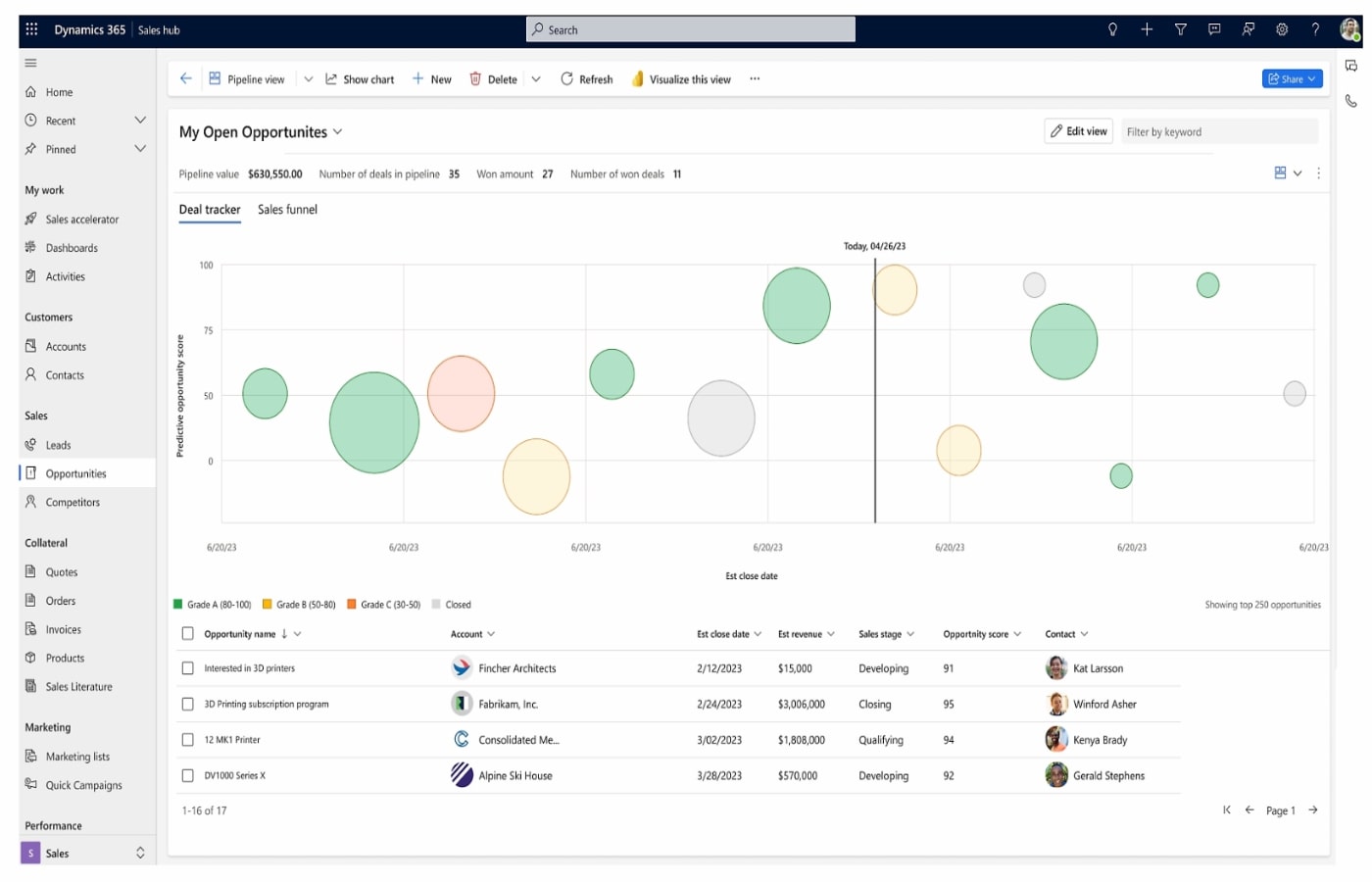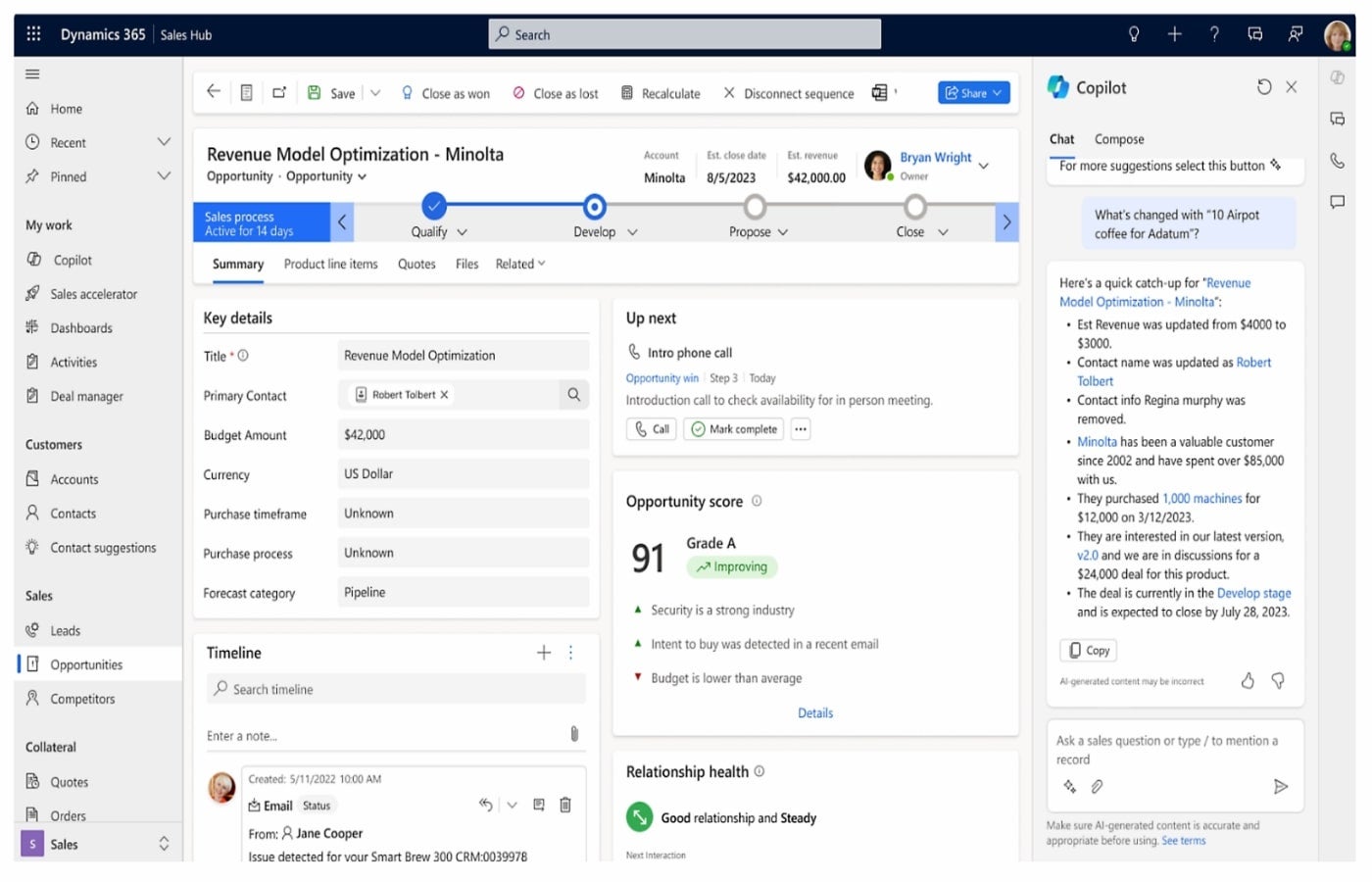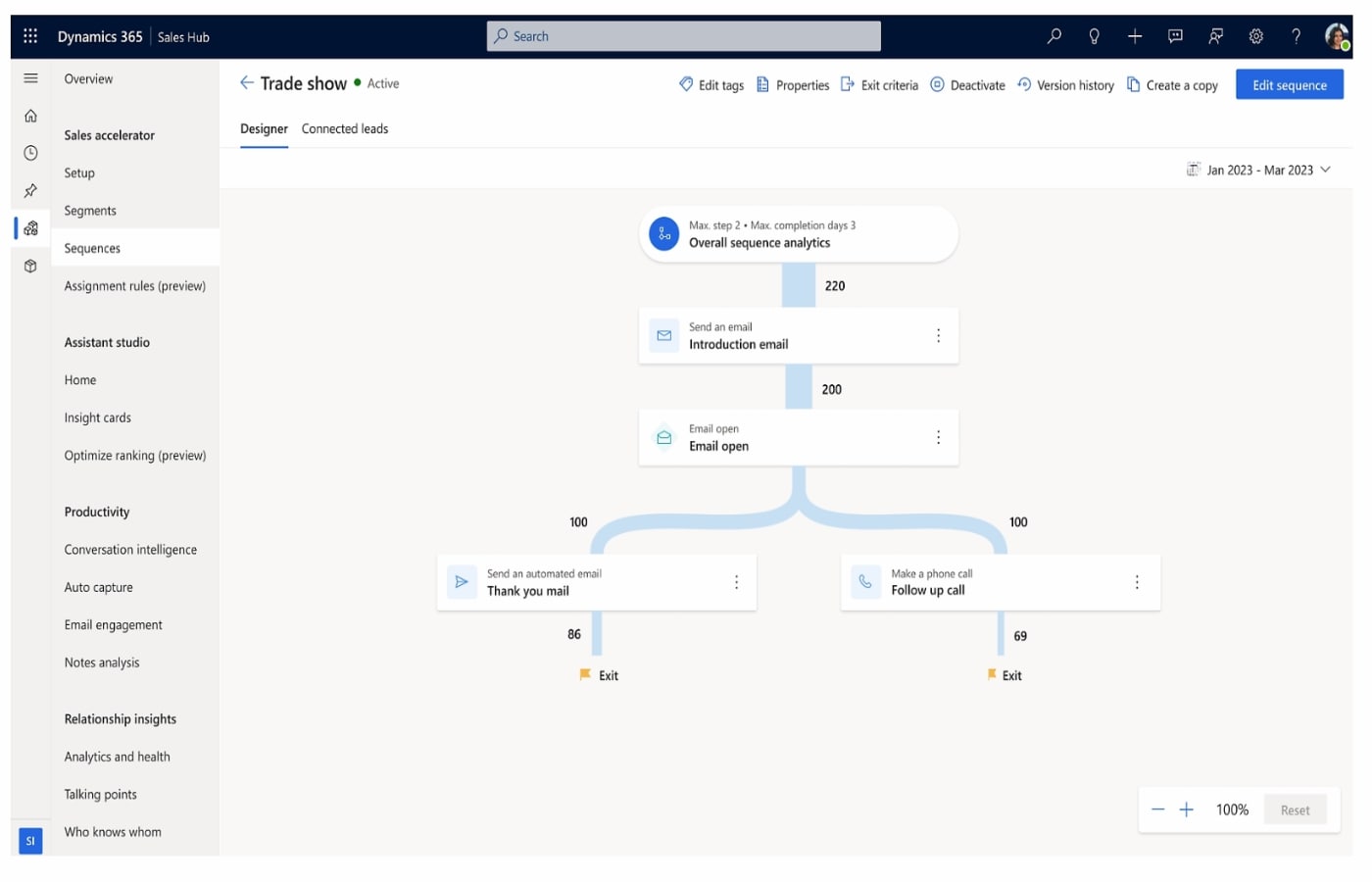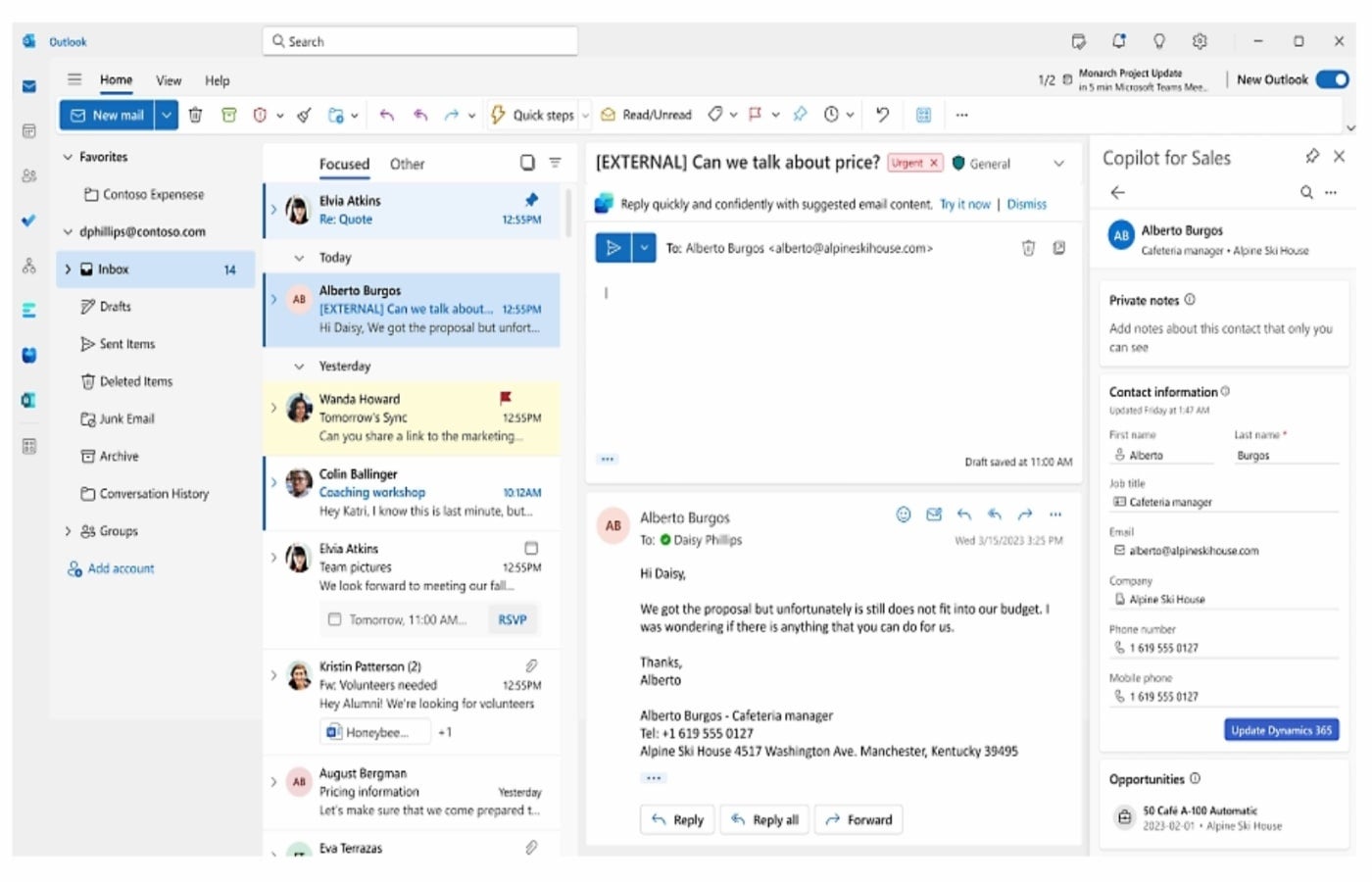Microsoft Dynamics 365 CRM fast factsOverall score: 3.3 Pricing: Starts at $65 per user per month for the first Dynamics 265 app and $20 per user per month for a subsequent qualifying Dynamics 365 app. Key features:
|
Microsoft Dynamics 365 is a cloud-based suite of business applications that offers both customer relationship management capabilities and enterprise resource planning tools. Formally Microsoft Dynamics 365 CRM, Microsoft Dynamics 365 Sales offers AI-powered sales services and marketing applications. These apps are all part of the greater Microsoft tech stack and can be configured and connected to meet business goals like engaging with customers, team members and potential leads.
While adding Dynamics 365 full CRM functionality makes sense — especially if you’re already a user of Microsoft applications — it is a pricey tool compared to other popular alternatives. In this review, we cover the pricing tiers and top features offered by Microsoft Dynamics 365 Sales, plus how it holds up against more simplified platforms.
Pricing
The free trial and onboarding for Microsoft Dynamics 365 is competitive and allows for a lengthy 30-day platform trial and demo experience. Chat with their sales team to get any unanswered questions resolved.
For interested buyers, Microsoft Dynamics 365 Sales is broken down into the following subscription tiers:
- Sales professional: $65 per user per month for the first Dynamics 265 app and $20 per user per month for a subsequent qualifying Dynamics 365 app.
- Sales enterprise: $95 per user per month for the first Dynamics 265 app and $20 per user per month for a subsequent qualifying Dynamics 365 app.
- Sales premium: $135 per user per month.
- Microsoft relationship sales: $162 per user per month.
Key features of Microsoft Dynamics 365
Lead scoring
Microsoft Dynamics 365 Sales AI-based scoring models that assign each contact, project and opportunity an Opportunity score users can track (Figure A). This tool helps ensure users are focusing their efforts on the right customers at the right time. Based on these lead and opportunity scores, deals can be filtered through a prioritized work list and data visualizations.

Opportunity summaries
Opportunity summaries are dashboard views within Microsoft Dynamics 365 Sales that show a variety of key details about any given project (Figure B). Where customers are in the buyer journey, contact information, timelines, files and next meetings. These summaries act as a hub of automation capabilities like email drafts, email or meeting summaries as well.

Sales sequences
Users can create visual sales sequences that reflect each step of engagement when nurturing leads (Figure C). This feature is great for organizations to track their different lead nurturing strategies, such as cold emailing or calling and what sales reps should do after an email is opened. It also gives timelines for when each step in the sales sequence is ideally completed.

Native integrations and automations
The same up-to-date information can be accessed from the different Microsoft 365 applications. Users can be in their Outlook account parsing emails from multiple clients and then open the Dynamics 365 Sales plugin integration, Copilot for Sales (Figure D). Verify notes or contact information while minimizing app-switching with automatic updates across the suite.

Microsoft Dynamics 365 pros and cons
| Pros | Cons |
|---|---|
| 30-day free trial. | Platform has a steep learning curve. |
| Phone and web customer support available for all tiers. | Costly tiers compared to other mid-market CRMs. |
| 24/7/365 data security guarantee. | Users report difficulty with the user interface. |
Alternatives to Microsoft Dynamics 365
While Microsoft Dynamics 365 is not an open-source CRM software, it can require some intense configuring of individual applications and features to get a setup specific to a business’s needs. Because of this, there are other top general CRM software, like HubSpot, Pipedrive and Zoho CRM that offer similar core features at a lower cost.
| Software | Microsoft Dynamics 365 | HubSpot | Pipedrive | Zoho CRM |
|---|---|---|---|---|
| Advanced AI tools | Yes | Yes | Yes | Yes |
| Custom dashboards | Yes | Limited | Yes | Limited |
| Pipeline management | Yes | Yes | Yes | Yes |
| Native or third-party integrations | Yes | Yes | Yes | Yes |
| Free trial | 30 days | None | 14 days | 15 days |
| Starting price, when billed annually | $65 per user per month | Free starting price | $14.90 per user per month | Free starting price |
HubSpot
Similar to Microsoft Dynamics 365, HubSpot is part of a suite of multiple applications and supports a multitude of integrations of both native and third-party apps. For this reason, both are great options for organizations looking to truly customize their CRM with additional add-ons and integrations. Microsoft Dynamics 365 can be pricey, while HubSpot’s free tier can support up to 2,500 users, with basic pipeline management and lead scoring making it more cost efficient. HubSpot’s conversation intelligence tool also allows reps to use data-backed insight as coaching tips for lead nurturing.
SEE: Read our complete review of HubSpot for a full breakdown of its offerings.
Pipedrive
Pipedrive is a strong sales CRM software that offers advanced pipeline management and tracking tools. Just like Microsoft Dynamics 365, Pipedrive has a variety of automations that can follow sales sequences to reduce mundane tasks like sending follow up emails, scheduling meetings and more. Both platforms strive to cut out admin work for reps so there’s more time for selling and relationship building. Pipedrive’s additional communication tracking feature allows users to filter and sort emails and meeting responses to understand intent and schedule future touchpoints.
SEE: If you want to learn more, head over to our complete review of Pipedrive.
Zoho CRM
Zoho CRM is a platform offering advanced multichannel marketing and sales intelligence tools. This platform also houses powerful AI tools, like Microsoft Dynamics 365, that can be used for predictive analytics and lead scoring. Zoho CRM’s AI-assistant, Zia, takes AI to a new level with advanced search capabilities, business intelligence and workload management amongst teams. Additionally, Zoho CRM’s 360-degree customer view allows a comprehensive view of each customer’s contact information, deal history and tracked activity.
SEE: Check out our complete individual review of Zoho CRM.
Review methodology
I used our inhouse rubric to score and review Microsoft Dynamics 365 and its core CRM software offerings. This rubric consists of defined criteria around the most important factors when evaluating general CRM software. I relied on Microsoft Dynamics 365’s own online resources in addition to real user feedback, scores and reviews.
The following is the breakdown of the criteria used to score Microsoft Dynamics 365:
- Cost: Weighted 25% of the total score.
- Core features: Weighted 25% of the total score.
- Customizations: Weighted 15% of the total score.
- Integrations: Weighted 15% of the total score.
- Ease of use: Weighted 10% of the total score.
- Customer support: Weighted 10% of the total score.
Source of Article



